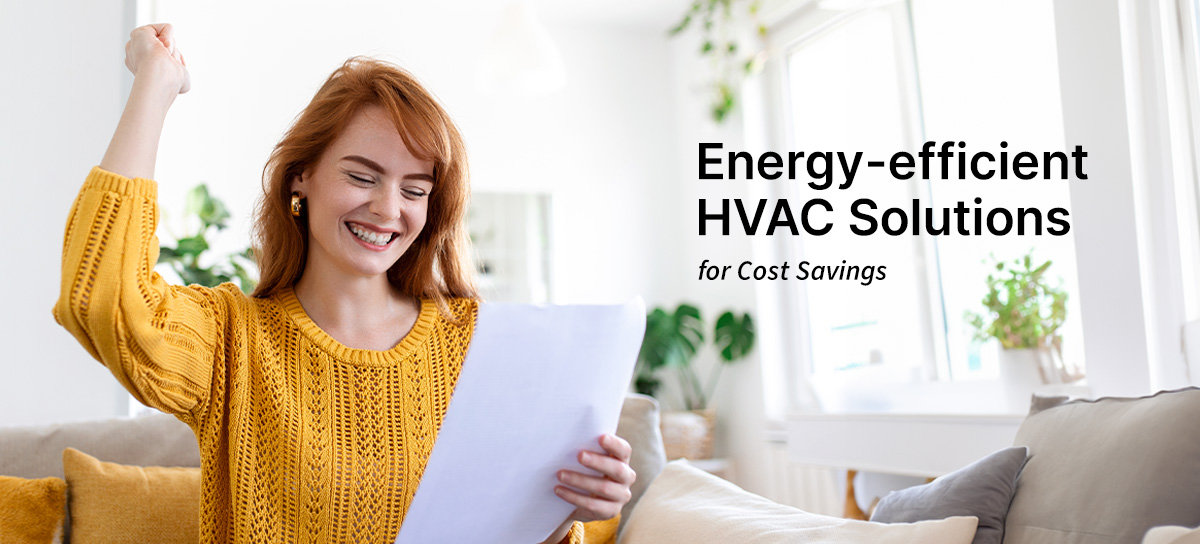
As the weather cools down, our instinct is to reach for the thermostat and dial up the temperature.
Before you do so, consider today’s blog post as a guide to being more energy-efficient over the coming cold weather season. This will not only reduce your utility bills and overall costs but it also plays a big role in becoming more sustainable and environmentally conscious.
One critical area where energy efficiency plays a key role is your HVAC (Heating, Ventilation, and Air Conditioning) systems. These systems are the backbone of indoor climate control, offering comfort and warmth in your homes and workplaces.
In this blog post, you will learn about the benefits of energy-efficient HVAC systems, energy efficiency ratings, technologies and tips for optimizing your HVAC efficiency.
We understand how this can seem daunting and overwhelming at best. We are here to support you through this process. Our highly skilled team is one phone call or email away, so don’t be afraid to reach out for any of your HVAC needs.
Energy-efficient HVAC systems provide a wide range of benefits. Let’s explore a few of the most relevant ones:
SEER is a critical rating for air conditioners. It measures how efficiently an air conditioner cools over an entire season. A higher SEER rating indicates greater energy efficiency, meaning the system consumes less electricity to achieve the desired cooling. Look for air conditioners with a SEER rating of 14 or higher for optimal efficiency.
The ENERGY STAR label is a widely recognized symbol for energy efficiency. It applies to various appliances and equipment, including HVAC systems. Products with the ENERGY STAR label meet or exceed strict energy efficiency guidelines set by the Environmental Protection Agency (EPA). When choosing HVAC equipment, opt for models with the ENERGY STAR label to ensure they meet high standards for efficiency.
HSPF is a rating specific to heat pumps, measuring their heating efficiency. Like SEER, a higher HSPF rating indicates better energy efficiency in heating mode. Look for heat pumps with a high HSPF rating, especially in regions where heating is a significant requirement.
AFUE is used for furnaces and boilers, measuring their efficiency in converting fuel (usually gas or oil) into heat. A higher AFUE percentage means less energy waste. Modern, energy-efficient furnaces often have AFUE ratings of 90% or higher.
EER is similar to SEER but focuses on a system's cooling efficiency at a specific outdoor temperature. It provides a snapshot of a system's performance at a given moment. While SEER is crucial for long-term efficiency, EER can help assess performance during peak conditions.
Energy-efficient HVAC technologies and features represent innovations that not only enhance comfort but also reduce energy consumption, lower utility bills, and contribute to a more sustainable and eco-friendly home.

Below are some key technologies worth knowing about:
Variable-speed or inverter-driven compressors are a significant advancement in air conditioning technology. Unlike traditional single-speed compressors that operate at full capacity and then cycle off, variable-speed compressors adjust their speed and output based on the cooling load.
Programmable thermostats allow users to set temperature schedules that align with their daily routines. For example, you can program the thermostat to raise the temperature while you're away at work and lower it before you return home.
To learn more, check our blog post, "Smart Home Integration with HVAC Systems"
Zone control systems divide a building into different zones, each with its thermostat and independent temperature control. This technology enables users to heat or cool specific areas of a building rather than the entire space. It's especially useful for multi-story homes or buildings with varying occupancy levels, ensuring that energy is not wasted on unoccupied areas.
To learn more about managing comfortable indoor temperatures, "HVAC Zoning for Personalized Comfort."
HRV and ERV systems exchange stale indoor air with fresh outdoor air while recovering heat or energy from the outgoing air. This process preconditions the incoming air, reducing the workload on your HVAC system. HRV and ERV systems enhance indoor air quality while minimizing energy loss.
Geothermal heat pumps use the stable temperature of the earth to efficiently heat and cool buildings. They can achieve remarkable energy efficiency because they don't rely on outside air temperatures. While installation costs can be higher, geothermal systems offer long-term energy savings and environmental benefits.
Smart thermostats and HVAC control systems use sensors and connectivity to optimize heating and cooling based on real-time conditions. They can learn your preferences, adjust settings remotely, and provide energy usage insights, ultimately leading to energy savings and enhanced convenience.
Ductless mini-split systems offer zoned heating and cooling without the need for ductwork. They're highly efficient because they don't suffer from duct-related energy losses. Each indoor unit can be controlled separately, reducing energy waste in unoccupied spaces.
Advanced air filtration and purification systems can be integrated into HVAC systems to remove allergens, pollutants, and contaminants from the air. Cleaner indoor air contributes to better health and well-being while reducing the need for HVAC system maintenance.
To learn more about improving your indoor air, check out our blog post, "How To Improve Your Indoor Air Quality And Enhance Home Comfort."
Implementing the tips and strategies shared below will help improve the efficiency of your existing HVAC system, lower your energy bills, and prolong the lifespan of your equipment.
Upgrading to more energy-efficient HVAC equipment is an opportunity for you to enhance both environmental sustainability and your financial well-being. Newer HVAC systems have advanced technologies that significantly reduce energy consumption while providing superior performance.
We understand how this can seem daunting and overwhelming at best. We are here to support you through this process. Our highly skilled team is one phone call or email away, so don’t be afraid to reach out for any of your HVAC needs.

Energy efficiency is a critical consideration when it comes to modernizing and optimizing your living spaces. In this age of environmental consciousness and rising energy costs, the efficiency of our Heating, Ventilation, and Air Conditioning (HVAC) systems plays a pivotal role in minimizing energy consumption, reducing carbon emissions, and ultimately, saving money.
HVAC systems are at the heart of maintaining indoor comfort, yet they can also be one of the biggest contributors to energy consumption in homes and commercial buildings. They work tirelessly to provide spaces with comfortable temperatures year-round, but without proper optimization, they can become energy hogs, significantly impacting both your environment and your wallet.
The purpose of this blog post is to delve into the world of HVAC system upgrades and explore the diverse range of solutions available to enhance energy efficiency. We'll unravel the complexities of these upgrades and discuss how each one contributes to creating a more sustainable and cost-effective approach to indoor climate control.
Whether you're a homeowner seeking ways to lower your monthly utility bills or a business owner looking to lessen your environmental footprint, this post will serve as a comprehensive guide to making informed decisions about improving your HVAC systems.
As always, our highly-skilled team is one phone call or email away, so don’t be afraid to reach out if you’re still unsure about how to go about upgrading your HVAC system.
Energy efficiency, in the context of HVAC systems, refers to the ability of these systems to provide optimal heating, cooling, and ventilation while using the least amount of energy possible. It's about achieving the desired indoor comfort levels while minimizing energy waste.
As the world grapples with the challenges of climate change, finding ways to reduce energy consumption is a global imperative. Energy-efficient HVAC systems play a crucial role in this effort, as they directly contribute to lowering greenhouse gas emissions and conserving valuable resources.
Conventional HVAC systems, while effective in providing indoor comfort, often come with a set of limitations and inefficiencies that can have far-reaching consequences. Understanding these drawbacks is crucial in recognizing the need for upgrades to improve energy efficiency.
Upgrading your HVAC system to enhance energy efficiency offers a range of compelling benefits that extend beyond just financial savings. These upgrades can make a significant impact on your quality of life, your environmental footprint, and the overall sustainability of your living or working space.

Here’s how:
There are a number of HVAC system upgrades you can install for increased energy efficiency. Each upgrade addresses specific challenges and contributes to a holistic approach to energy conservation, reducing your carbon footprint and improving your overall quality of life.
Embarking on HVAC system upgrades requires careful planning to ensure you make informed decisions that align with your goals and budget.
Here's a step-by-step guide to help you navigate the process:
At Advance Heating and Cooling, we have one goal — to empower our customers to make energy-efficient choices for their homes and workplaces through optimized HVAC systems. Energy consumption is both a global imperative and a community effort. Every effort matters in reducing carbon emissions and in turn, lowering living costs.

This blog post serves as a tool to have on hand when you’re ready to upgrade your HVAC systems to operate more efficiently. As always, our highly-skilled team is one phone call or email away, so don’t be afraid to reach out if you’re still unsure about how to go about upgrading your HVAC system.
